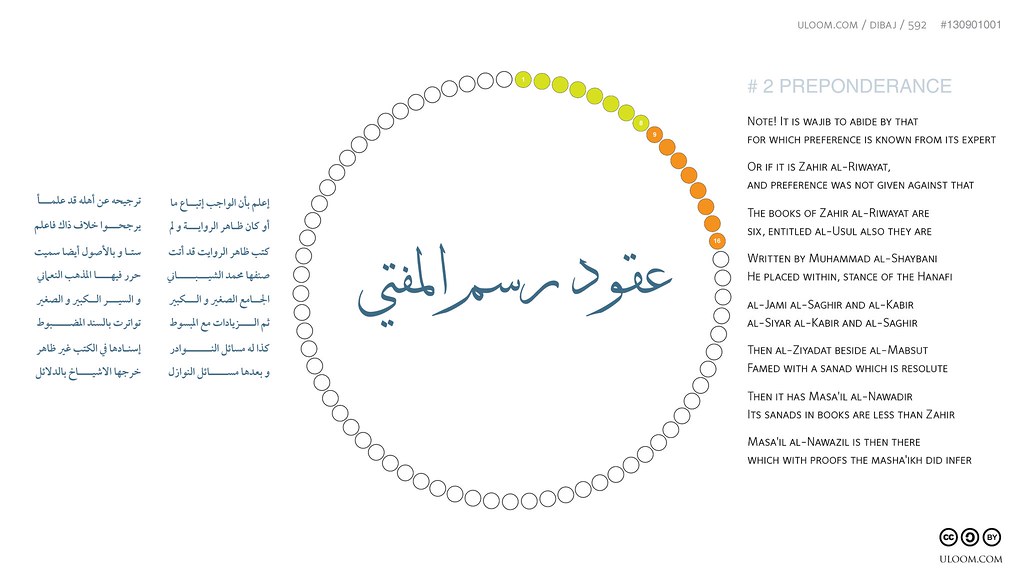24 Shaw, 1434 AH / 1 Sept, 2013 CE

[The following is part (2) of a series on two commentaries of Allm. Ibn Abidin Shami's Uqud Rasm al-Mufti. The first commentary is an elaboration by Muhammad Saifur Rahman placed under summary. The second commentary is a translation of Allm. Ibn Abidin Shami's Sharh Uqud Rasm al-Mufti.]
Summary
Note! It is wajib to abide by, act upon and give fatwa according to that for which preference and preponderance, over a alternate weaker view, is known and established from its expert who are qualified to give preponderance in that Mazhab. Ijma is stated on this fact.
To act or confer an edict on personal whim is forbidden without doubt whilst to rely on solitary intellect is to forego the jama'at and not the way of the salaf ; both are the path to peril. The inferior view when compared to the dominant is as if non-existent. Hence, the Mufti must act and confer only those edicts for which preponderance is established by the experts of that Mazhab.
Sharh Uqud Rasm al-Mufti
[Allamah Ibn Abidin (may Allah have mercy upon him) says:]
| Note! It is wajib to abide by that | اعلم بان الواجب اتباع ما |
| for which preference is known from its expert | ترجيحه عن اهله قد علما |
[RULE] It is compulsory upon those who intend to act or advise others that they adopt the view which has been given preponderance to by the Ulama of their own mazhab. As such it is not permissible for a person to act or give fatwa upon that which has been considered inferior except in few cases as will be discussed later.
[EVIDENCE] Consensus has been stated on this. Muhaqqiq ibn Hajar Makki in Fatawa Kubra cites Zawa’id al-Raudha and states, “It is not allowed for a Mufti or a person to give fatwa or act on an issue when there are two opinions or methods without considering them both. This view is unopposed. Consensus has previously been stated on this [principle] from the likes of Ibn Salah and the Malikite Mufti Baji. The decree of Qarafi is also indicative to this fact; it is not permissible for a Mufti or Muqallid to pass judgement or give fatwa contrary to that which has been given preponderance to as it entails following one’s whim; an action which is unanimously considered haram. In the event that there is no evidence with which a mujtahid may decide on one view over another and [as a result] becomes incapacitated from making a preference, the [Mujtahid] Muqallid may select any view from the two as per [proven through] ijma.” (End [of quote from Fatawa Kubra])
[SUPPORT] Imam Qasim ibn Qutlubgha states in the beginning of his book Tashih al-Quduri, “I have seen [from] those who adhere to the mazhab of our imams [following their] whims. So much so I noticed the words of some judges, ‘Is this prohibited?’ To which I replied, ‘Yes, following one’s whim is prohibited. ‘ And the inferior view when compared to the dominant is as if nonexistent. It is prohibited to give preference on an issue when the alternative is not known.” It is stated in Kitab al-Usul by Ya’mari, “A person who is unaware of the prevalent view from two statements has no interest in the subject and will decide on a whim from the two without considering the dominant view.”
[SUPPORT] Imam Abu Amr [Ibn Salah] states in Adab al-Mufti, “Note! Those who rely on their fatwa or action of being compliant with only one viewpoint or aspects of an issue and act upon these without considering the dominant view then know he has been foolish and breached consensus.”
[ILLUSTRATE] Baji relates an incident which had occurred to him. Some people had given a fatwa which was unfavourable to him so he asked them regarding it to which they exclaimed that ‘we were unaware it was for you’ and changed their fatwa to one which was sympathetic to him. Baji states, ‘It is undisputed amongst Muslims, who believe in ijma, that this is prohibited.’ It is stated in Usul Aqdiyyah that there is no difference between a Mufti and Qadhi (judge) except that a Mufti informs of a legal ruling whilst a judge enforces it. (End [of quote from Tashih Quduri])
[Conclusion] Thereafter, he [Imam Qutlubgha] says, “To give a judgment or fatwa with that which has been given preponderance against (Marjuh) is against ijma.”
[NOTE] The issue relating to when no preponderance is found between two views is forthcoming [in line 66 of the poem].
[NOTE] My statement, “By its expert” (عن أهله) means by the experts qualified to give preponderance; indicating that the preponderance of any Alim will not suffice.
Muhammad Saifur Rahman Nawhami
24 Shawwal 1434
1 September 2013
Type: Article, Translation
Subject: Usul
Author: M. Saifur Rahman Nawhami
Collection: Dibaj
ID: 130901501
Updated: 26-October-2024